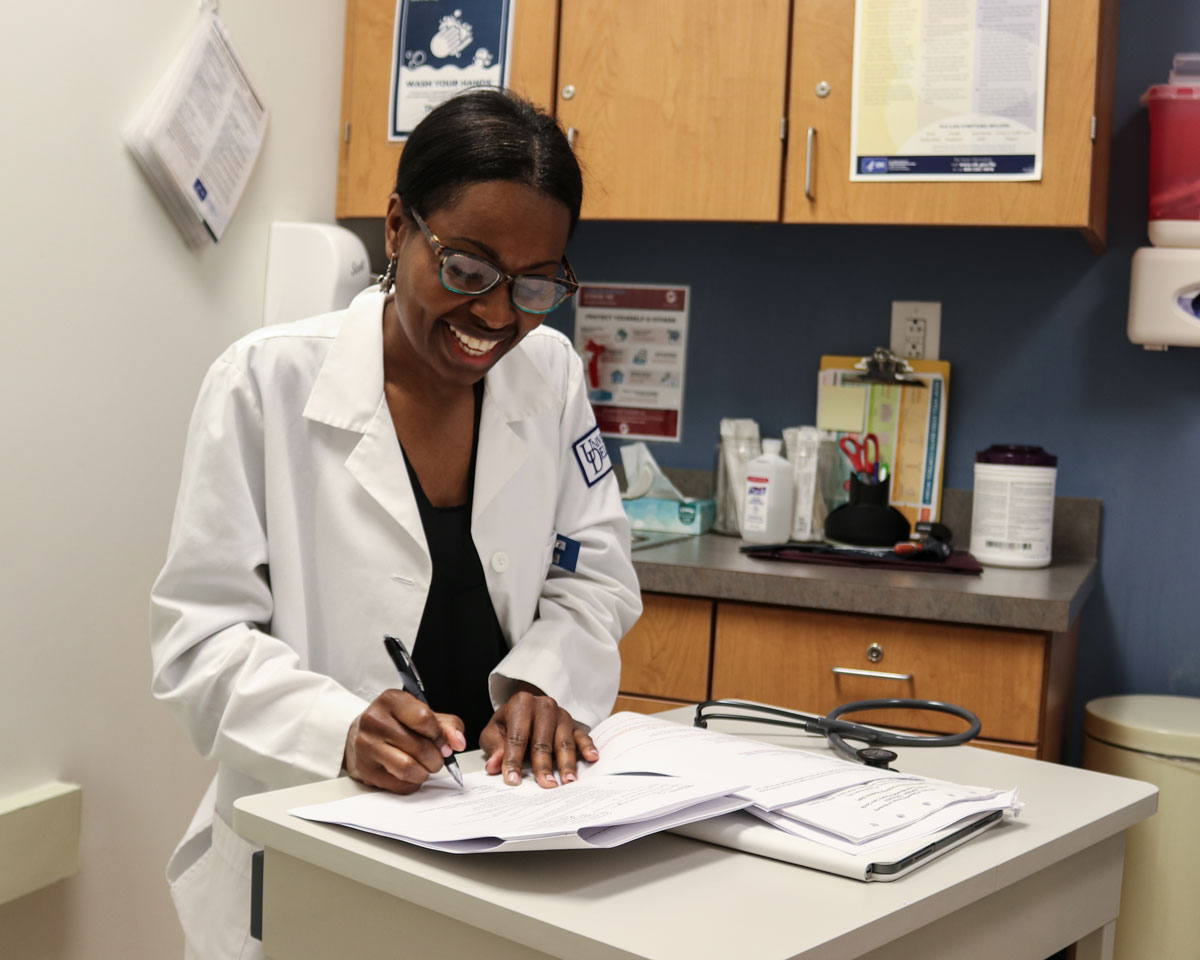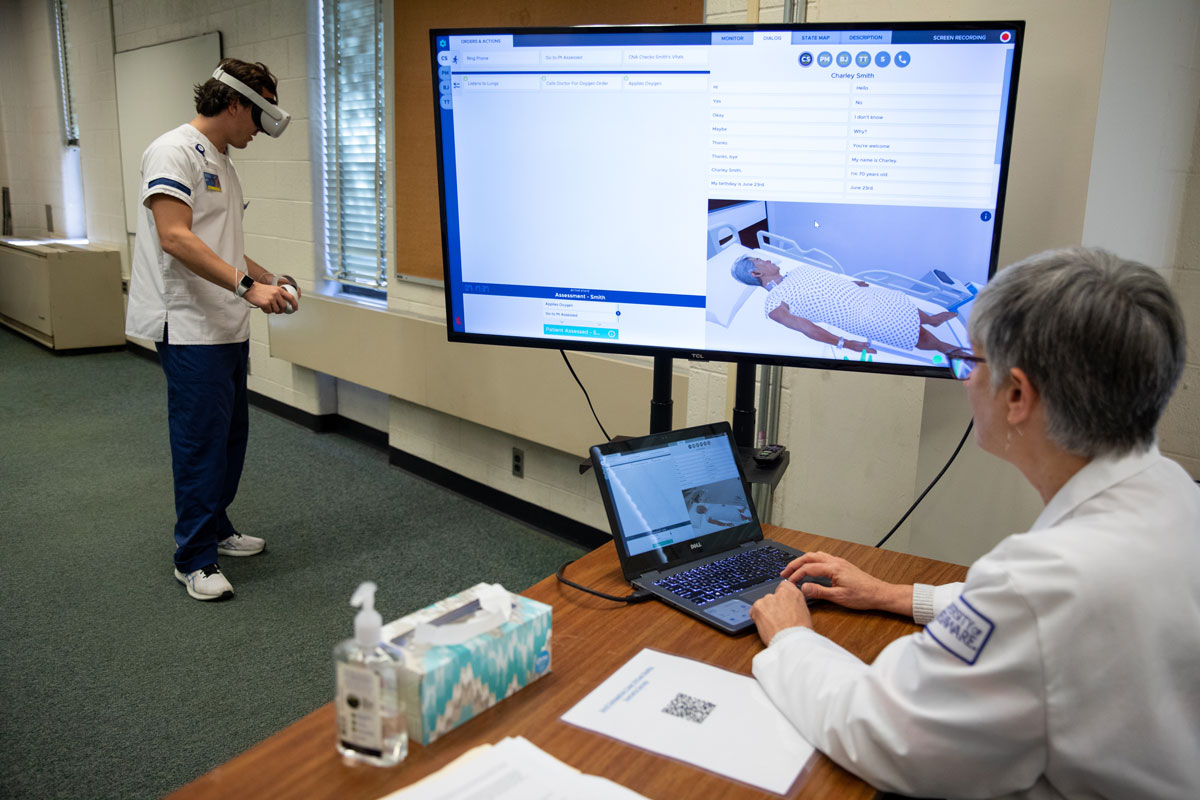
school of nursing research
Our faculty are recognized experts in their areas of interdisciplinary research. The faculty have external funding from a variety of sources, including NIH, Veterans Administration, and various foundations.
Our Focus Areas
The School of Nursing aligns with the National Institute of Nursing Research (NINR) and its identified research lenses: Health Equity, Social Determinants of Health, Population and Community Health, Prevention and Health Promotion, and Systems and Models of Care. Collectively, these areas of focus leverage the strengths of nursing research while promoting cross-disciplinary and -sectoral collaboration and community engagement. The University of Delaware School of Nursing is well positioned to address these areas with the support of our expert faculty, whose expertise include biological, behavioral, social and public health sciences.

Prevention and Health Promotion
Research through the prevention and health promotion lens aims to prevent disease and promote health through the continuum of prevention – from primordial to tertiary.
Faculty Researcher:
Christine Hoch, PHD, RN, ACNS-BC – Assistant Professor
Heart Failure symptoms significantly impact patients’ quality of life, often hindering their ability to perform daily tasks and maintain social relationships. Understanding the underlying mechanisms can lead to better management strategies and interventions, ultimately improving patient outcomes and reducing health burden. Dr. Hoch is focusing her research on the symptom of fatigue with a specific interest in cellular bioenergetics.

Health Equity
Studies aimed at producing evidence needed to reduce and ultimately eliminate the systemic and structural inequities that place some population groups at a disadvantage in attaining their full health potential.
Faculty Researcher:
Lauren Covington, PhD, MS, RN – Assistant Professor
Community Based Participatory Research (CBPR) is a conduit by which to address health inequities. CBPR involves communities directly in the research process so that interventions are tailored to the community’s specific needs and are contextually and culturally relevant. As such, Dr. Covington and team are engaging with Delaware school nurses to address statewide pediatric health inequities. Through hosting annual statewide professional development days to address school nurse knowledge gaps, meeting monthly with a team of pediatric researchers and school nurses/nurse leaders from different districts and applying for a variety of funding mechanisms, we are collaboratively moving forward to address top priorities and barriers to pediatric health equity in the state.

Social Determinants of Health
Research examining the conditions in which people are born, live, learn, work, play, and age — identifying effective approaches to address social factors and social needs to improve health outcomes.
Faculty Researcher:
Kathleen Brewer-Smyth, PHD, RN, MSN, CRRN, FAAN - Professor
Dr. Brewer-Smyth’s program of research focuses on adverse childhood experiences (ACEs), abuse throughout the lifespan, hypothalamic-pituitary-adrenal (HPA) axis salivary cortisol regulation, and neurological dysfunction, especially traumatic brain injury (TBI) and associated high risk behaviors and health outcomes later in life. She and her collaborators have published on how these variables are associated with mental and general health, adult obesity, sleep, HIV risk behaviors, alcohol misuse, suicide attempts, homicide, and other violent behaviors in populations at risk, including female prison inmates and homeless women. Her team has shown that supportive faith-based environments and higher forgiveness scores are associated with healthier bio-behavioral outcomes for female survivors after abuse and other trauma. Her work has been supported by funding from the Centers for Disease Control and Prevention (CDC), National Institutes of Health (NIH), and Foundations including the University of Delaware Research Foundation (UDRF).
She is the author of Adverse Childhood Experiences: The Neuroscience of Trauma, Resilience and Healing throughout the Life Course, published by Springer Nature that won four American Journal of Nursing (AJN) Book of the Year Awards. (1st place in Community/ Home Health, Creative Works, and Psych/ Mental Health and 3rd place in Consumer Health).

Population and Community Health
Studies that address critical health challenges at a macro level by focusing on interventions that affect groups of people with shared characteristics or those who live within a shared area.
Faculty researcher:
Xiaopeng Ji, PhD, MSN, MA, RN – Associate Professor
Poor sleep and circadian health impair daytime function as well as neurocognitive, mental and cardiometabolic health among adolescents and young adults. Implementing evidence-based sleep interventions, scalable from clinical to population venues, is essential to ameliorate chronic health conditions and promote well-being. Dr. Ji's program of research integrates artificial intelligence technologies with a community-based participatory approach to develop personalized and interactive sleep interventions, thus enhancing the quality and speed of the research translational process.

Systems and Models of Care
Research that addresses clinical, organizational, and policy challenges through the development, dissemination, and implementation of new systems and models of care.
Faculty Researcher:
Elizabeth Speakman, EdD, RN, FNAP, ANEF, FAAN - Senior Associate Dean, School of Nursing
The UD-Bayhealth Scholars Project addresses critical clinical and workforce challenges by piloting an innovative model of academic-practice partnership. This research examines whether nursing students who complete immersive, year-long clinical placements at a single institution (Bayhealth) demonstrate stronger clinical knowledge, judgment, resilience, and readiness for practice compared to traditional multi-site models. Through structured mentorship by Bayhealth-employed Faculty Clinical Scholars and targeted post-graduation support, this system aims to enhance new nurse transition, improve retention, and build a sustainable future pipeline of nursing faculty, particularly within non-academic health centers. By strengthening academic-practice collaboration, the project advances the development, dissemination, and implementation of new systems and models of care to better meet workforce demands.

Nursing Education
Research is faculty and student centered, that focuses on the science of learning and the science of teaching. The desired outcome is related to how well the educational approaches and assessments resulted in nurses providing excellent patient care. Examples include didactic, experiential, and simulation learning experiences.
Faculty Researcher:
Heiddy DiGregorio, PhD, APRN, PCNS-BC, CHSE, CNE - Director, Simulation and Interprofessional Education
Simulation-based research serves as a powerful catalyst for innovation in healthcare education, driving the exploration of advanced teaching and learning methodologies. At its core, simulation facilitation plays a pivotal role in ensuring learners engage meaningfully with simulated experiences, fostering clinical reasoning and evidence-based decision-making.
Dr. DiGregorio and the Center for Simulation Innovation, Interdisciplinary Education, and Entrepreneurship (CSIIDEE) are committed to advancing research and scholarship that align with best practices and drive simulation excellence forward. Their work focuses on evidence-based facilitation strategies, equipping simulation educators with the tools necessary to deepen learning and enhance skill acquisition.
To sustain these initiatives, securing grant funding is essential. Multiple organizations support the advancement of simulation-based research and scholarship, providing resources to refine methodologies, integrate emerging technologies, and contribute meaningfully to the broader field of healthcare education. By strategically leveraging these funding opportunities, CSIIDEE continues to pioneer advancements in simulation pedagogy, ensuring its lasting impact on interdisciplinary healthcare training.
